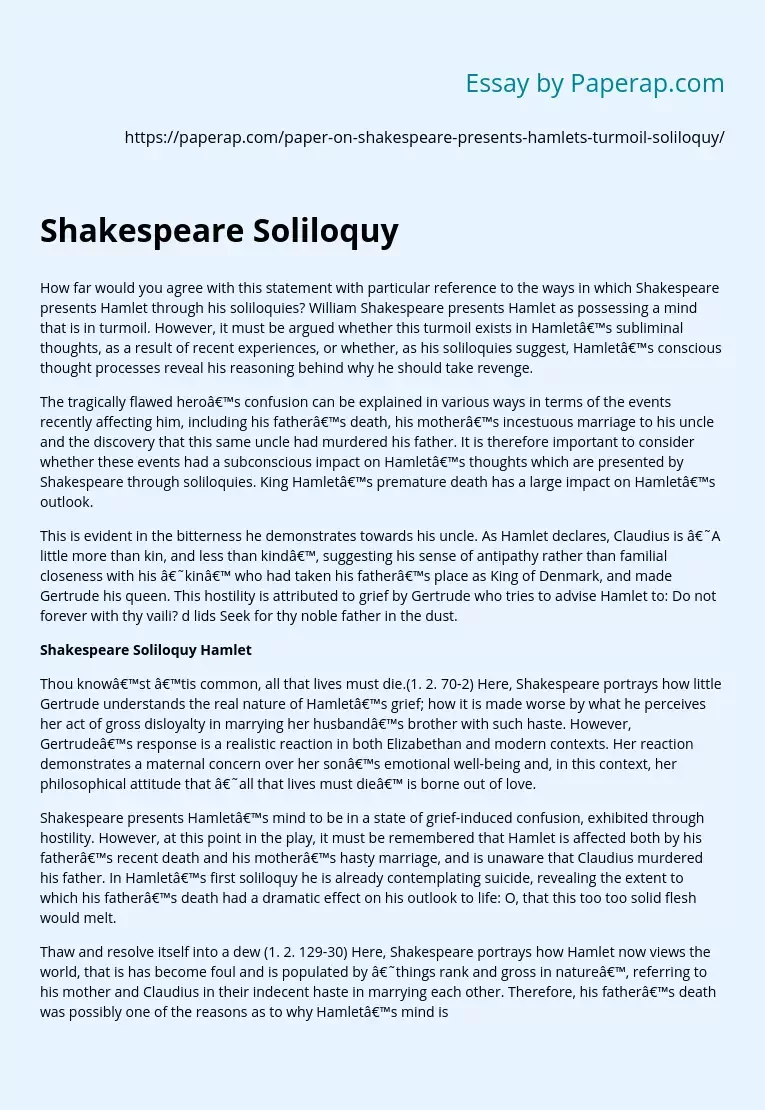Shakespeare Soliloquy
How far would you agree with this statement with particular reference to the ways in which Shakespeare presents Hamlet through his soliloquies? William Shakespeare presents Hamlet as possessing a mind that is in turmoil. However, it must be argued whether this turmoil exists in Hamlet’s subliminal thoughts, as a result of recent experiences, or whether, as his soliloquies suggest, Hamlet’s conscious thought processes reveal his reasoning behind why he should take revenge.
The tragically flawed hero’s confusion can be explained in various ways in terms of the events recently affecting him, including his father’s death, his mother’s incestuous marriage to his uncle and the discovery that this same uncle had murdered his father.
It is therefore important to consider whether these events had a subconscious impact on Hamlet’s thoughts which are presented by Shakespeare through soliloquies. King Hamlet’s premature death has a large impact on Hamlet’s outlook.
This is evident in the bitterness he demonstrates towards his uncle.
As Hamlet declares, Claudius is ‘A little more than kin, and less than kind’, suggesting his sense of antipathy rather than familial closeness with his ‘kin’ who had taken his father’s place as King of Denmark, and made Gertrude his queen. This hostility is attributed to grief by Gertrude who tries to advise Hamlet to: Do not forever with thy vaili? d lids Seek for thy noble father in the dust.
Shakespeare Soliloquy Hamlet
Thou know’st ’tis common, all that lives must die.
(1. 2. 70-2) Here, Shakespeare portrays how little Gertrude understands the real nature of Hamlet’s grief; how it is made worse by what he perceives her act of gross disloyalty in marrying her husband’s brother with such haste. However, Gertrude’s response is a realistic reaction in both Elizabethan and modern contexts. Her reaction demonstrates a maternal concern over her son’s emotional well-being and, in this context, her philosophical attitude that ‘all that lives must die’ is borne out of love.
Shakespeare presents Hamlet’s mind to be in a state of grief-induced confusion, exhibited through hostility. However, at this point in the play, it must be remembered that Hamlet is affected both by his father’s recent death and his mother’s hasty marriage, and is unaware that Claudius murdered his father. In Hamlet’s first soliloquy he is already contemplating suicide, revealing the extent to which his father’s death had a dramatic effect on his outlook to life: O, that this too too solid flesh would melt.
Thaw and resolve itself into a dew (1. 2. 129-30) Here, Shakespeare portrays how Hamlet now views the world, that is has become foul and is populated by ‘things rank and gross in nature’, referring to his mother and Claudius in their indecent haste in marrying each other. Therefore, his father’s death was possibly one of the reasons as to why Hamlet’s mind is in turmoil. Although, Hamlet’s soliloquies are possibly representative of a reflective philosopher with his soliloquies providing a gateway into Hamlet’s thought processes.
For instance, he tries to reason whether he should believe the Ghost’s proclamation that King Hamlet was murdered by Claudius. However, although Hamlet’s suicidal thoughts are presented in soliloquies, whether these are what he is truly feeling needs to be considered. Shakespeare is merely suggesting Hamlet is contemplative of suicide because he never actually acts upon his thoughts. Jacques Lacan’s theory, ‘I am not where I think’ (Lacan, 14), may be applied to Hamlet’s character because what Hamlet is thinking is not necessarily what he believes, suggested in his statement to Claudius:So Uncle, there you are.
Now to my word: It is ‘Adieu, adieu remember me’ I have sworn’t (1. 5. 110-2) Here, Shakespeare reveals Hamlet’s criticism of his hesitation when taking vengeance upon his uncle, ‘my thoughts be bloody or be nothing worth’. Hamlet delays his action throughout the play, waiting until he can confirm Claudius actually murdered his father, suggesting that Hamlet’s thoughts are indeed ‘nothing worth’ because he does not immediately act upon his thoughts.
Furthermore, the political aspects Shakespeare presents in Hamlet relate to Hamlet’s duty, as a prince, to avenge the King if he has been murdered. It is therefore important to consider the Elizabethan context in which Hamlet may be perceived in comparison to the twenty-first century, thus: Like John-a-dreams, unpregnant of my cause, And can say nothing – no, not for a king (2. 2. 520-1).
Shakespeare Soliloquy. (2019, Dec 05). Retrieved from https://paperap.com/paper-on-shakespeare-presents-hamlets-turmoil-soliloquy/

